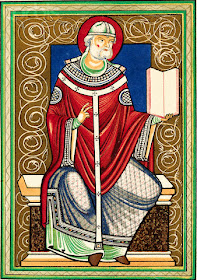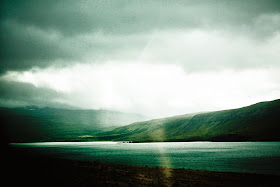 |
| Mosaic of St. Ambrose - Courtesy of Wikipedia |
Aeterne Rerum Conditor is by the Bishop of Milan, St. Ambrose of Milan (340-397). It is one of just four Ambrosian chants that modern scholars ascribe with certainty to Ambrose. Of the hymns sung in the Church of Milan at that time, St. Augustine of Hippo (354-430) writes in The Confessions: "How greatly did I weep in Your hymns and canticles, deeply moved by the voices of Your sweet-speaking Church! The voices flowed into mine ears, and the truth was poured forth into my heart, whence the agitation of my piety overflowed, and my tears ran over, and blessed was I therein.". In 1632, in accordance with revisions made to the hymns of the Divine Office by Pope Urban VIII (1568-1644) it was changed to Aeterne Rerum Conditor (1632). Both versions are shown below. It is sung at Sunday Lauds in the Roman Breviary.
Ambrosian Chant
AETERNE RERUM CONDITOR by St. Ambrose
1. Aeterne rerum conditor,
noctem diemque qui regis,
et temporum das tempora,
ut alleves fastidium;
2. Praeco diei iam sonat,
noctis profundae pervigil,
nocturna lux viantibus
a nocte noctem segregans.
3. Hoc excitatus lucifer
solvit polum caligine,
hoc omnis erronum chorus
vias nocendi deserit.
4. Hoc nauta vires colligit
pontique mitescunt freta,
hoc ipsa petra ecclesiae
canente culpam diluit.
5. Surgamus ergo strenue!
Gallus iacentes excitat,
et somnolentos increpat,
Gallus negantes arguit.
6. Gallo canente spes redit,
aegris salus refunditur,
mucro latronis conditur,
lapsis fides revertitur.
7. Iesu, labantes respice,
et nos videndo corrige,
si respicis, lapsus cadunt,
fletuque culpa solvitur.
8. Tu lux refulge sensibus,
mentisque somnum discute,
te nostra vox primum sonet
et ore psallamus tibi.
9. Sit, Christe, Rex piissime,
tibi Patrique gloria
cum Spiritu Paraclito,
in sempiterna saecula. Amen.
AETERNE RERUM CONDITOR (1632 Version)
1. Aeterne rerum Conditor,
Noctem diemque qui regis,
Et temporum das temporã,
ut alleves fastidium.
2. Nocturna lux viantibus
A nocte noctem. segregans,
Praeco diei iam sonat,
Iubarque solis evocat.
3. Hoc excitatus lucifer
Solvit polum caligine:
Hoc omnis erronum cohors
Viam nocendi deserit.
4. Hoc nauta vires colligit,
Pontique mitescunt freta:
Hoc, ipsa petra Ecclesiae.
Canente, culpam diluit.
5. Surgamus ergo strenue:
Gallus iacentes excitat,
Et somnolentos increpat,
Gallus negantes arguit.
6. Gallo canente spes redit,
Aegris salus refunditur,
Mucro latronis conditur,
Lapsis fides revertitur.
7. Iesu labantes respice,
Et nos videndo corrige:
Se respicis, labes cadunt,
Fletuque culpa solvitur.
8. Tu lux refulge sensibus,
Mentisque somnum discute:
Te nostra vox primum sonet,
Et vota solvamus tibi.
9. Deo Patri sit gloria,
Eiusque soli Filio,
Cum Spiritu Paraclito,
Nunc et per omne saeculum. Amen












